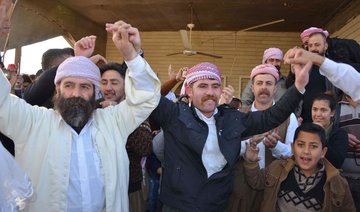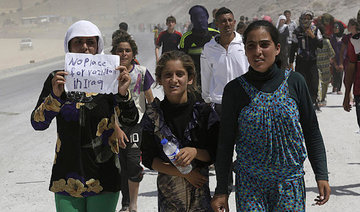PARIS: The world is failing Yazidi women forced into sex slavery by Daesh militants in Iraq and Syria, with 3,000 still unaccounted for, according to the head of a charity dedicated to helping survivors recover from their horrific experiences.
Murad Ismael said many Yazidi women and girls have been brainwashed or killed in captivity, while those who have managed to escape after years of enslavement and rape were left struggling to survive without an income or identity papers.
“Every inch of these women’s body and soul is broken,” said Ismael, executive director of Yazda.
“And yet the international system is failing to embrace them and help them return to normal life,” said Ismael ahead of the Foundation’s Trust Conference on modern slavery in Brussels on Wednesday.
“These girls, they just want to resume school, go back to normal. But they’re not given any income or support so many of them have to be a father and a mother to their siblings, in addition to being a survivor.”
The Yazidi, a religious sect whose beliefs combine elements of ancient Middle Eastern religions, are regarded by Daesh as devil-worshippers.
Thousands of women and girls of the Yazidi faith were abducted, tortured and sexually abused by Daesh fighters who invaded their homeland in northwest Iraq, in 2014.
The militants were driven out a year ago, but most Yazidis have yet to return to their villages and nearly 3,000 women and children remain in captivity.
“We used to get over 100 rescued women and girls arriving to our office each month, but now we only see five or six,” said Ismael.
“The pace of rescues is slowing down because many of these women have already been killed or brainwashed by their captors.”
Manal, a young Yazidi woman who was kidnapped at the age of 17 by Daesh in 2014 and is now being supported by Yazda after being rescued, said her captors beat her until she was unconscious.
“When I woke up there were scars on my body and blood all over my clothes,” she said in Arabic through a translator.
“I tried to kill myself several times but I didn’t succeed. They didn’t care and raped me again and again.”
Now living with her family in a refugee camp in Qadiya, northern Iraq, she said she wanted to become a psychiatrist to help other survivors.
Baroness Nicholson, founder and chair of the British-based AMAR Foundation which provides education and health care in the Middle East, said the world’s religions should urgently recognize the Yazidi faith.
“Unless this is done, they will continue to be considered by some – quite wrongly — as devil worshippers, giving vile people the excuse they need to attack them,” she said by email.
Nicholson urged the international community to ensure the Yazidis could return home safely, and offer them asylum if they could not face doing so.
“The horrendous suffering of those women and girls so monstrously violated by Daesh should remain in the public consciousness forever,” she said.
Iraqi Prime Minister Haider Al-Abadi declared victory over Daesh in December, five months after his forces recaptured the country’s second city Mosul in a protracted battle with the militants.
The group continues to carry out bombings, assassinations and ambushes in different areas of Iraq, and remains active in neighboring Syria.
“It’s incredible that there has been no justice, not a single trial” for the massacre and detention of 12,000 Yazidi people, Ismael said at the Trust Conference on Wednesday.
“Those (Yazidis) who survived have no hope to return to their homes, it’s all land mines and mass graves,” he added.
World failing Yazidi women forced into sex slavery
World failing Yazidi women forced into sex slavery

- Many Yazidi women and girls have been brainwashed or killed in captivity, while those who have managed to escape after years of enslavement and rape are left struggling to survive without an income or identity papers.
- Baroness Nicholson, founder and chair of the British-based AMAR Foundation which provides education and health care in the Middle East, said the world’s religions should urgently recognize the Yazidi faith.












